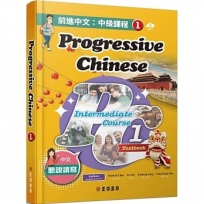前進中文:中級課程1(繁體版)(可下載雲端MP3) Progressive Chinese: Intermediate Course 1 (Traditional Character Edition)
出版社:正中書局
出版日期:2023-12-18
語言:中文
ISBN:9789570919936
裝訂:平裝
定價:600 元
˙參照ACTFL所定語言能力標準設定學習目標
˙依照反向設計的原則為中級學習者制定相應的教學目標
˙結合ACTFL的三種交際溝通模式及5C理念設計教材
˙幫助學習者獲得全面性的進步與具體的語言能力
˙選詞參照了漢語水準考試(HSK)、華語文能力測驗(TOCFL),並兼顧兩岸差異
近年來華語學習者背景趨向多元,中文的自學者人數也日益增長。編者在教學中發現,偏向學校生活和青年文化的主題,常常無法滿足成年學習者的需求和興趣。因此傾力將《前進中文》編寫成一套能同時符合社會職場人士與大學生各自需求,亦能符合其語言能力和認知程度的教材。
本教材由四位於美國教學中文的一線教師共同編著,為其教學後反思所做的行動研究成果,在出版前曾實際運用於教學中,藉此發現問題、獲得學生回饋,並進行調整,方完成最後編寫。本教材共兩冊,每冊四個單元,以主題進行規劃,並依照美國外語教學委員會(ACTFL)所制定的語言能力標準設定學習目標。第一冊目標由初級高提升至中級中;第二冊目標由中級中提升至中級高。
《前進中文》按照反向設計的原則,根據ACTFL的中級與高階語言能力目標,制定相應的教學目標,並在目標確定後通過形成性和總結性測試,在每節課與每個單元的學習過程中建立一個完整、有機的測評系統,説明學習者不斷進步。在逐步提供中級學習者語言技巧發展所需語言任務的同時,《前進中文》課文內容設計也結合ACTFL的三種交際溝通模式,即理解詮釋、人際交流和表達演示,以及ACTFL的5C理念(即Communication溝通、Culture文化、Connection連接、Comparison對比、Community社區)。
《前進中文》除了可幫助中級中文學習者獲得全面性的進步之外,亦能培養學習者以下具體的語言能力:
1. ACTFL Oral Proficiency Interview中級語言使用者所需要的問答能力,並可處理簡單的交際任務(對於優秀學習者,高階語言使用者所需要的簡單敘述、比較、描述等能力亦能同時培養)。
2. 理解成段的中文篇章,因此能產出句段形式的中文。
3. 建立聽力、閱讀策略,培養對不熟悉語言成分的容忍度、泛聽/讀能力,以及猜測的能力。
4. 發展並運用語言學習策略,逐漸成為獨立的中文學習者,以達到終身學習的目的。
˙The learning goals that center on the thematic units are set in accordance with the language proficiency levels, established by the ACTFL
˙To Comply with the pedagogical principle of backward design to establish the teaching/learning goals for the intermediate learner of Chinese
˙Integrates into its thematic contents the ACTFL-defined, three mores of language uses as well the 5C concepts
˙Assist the learner to achieve holistic progress and to cultivate specific linguistic abilities of Chinese
˙The selecting of keywords/phrases in thetextbooks is greatly in line with vocabulary levels defined by the HSK and by the TOCFL. The regional difference in language uses between the two sides of theTaiwan Strait are also meticulously annotated in the textbooks
In recent years, the background of learners has become diversified, and the number of self-study students of elementary Chinese is also increasing. On the pedagogical front, however, learning materials, found to be biased towards school life and youth culture, fail to meet the needs and interests of adult learners. In response to the current dilemma, “Progressive Chinese: Intermediate Course” is thus designed for people from all works of life.
“Progressive Chinese: Intermediate Course” is based on the results of action research done by experienced Chinese instructors affiliated in colleges and universities in the United States. This series of textbooks is a set of two volumes, and each volume is composed of four thematic units. The learning goals that center on the thematic units are set in accordance with the language proficiency levels, established by the American Council on the Teaching of Foreign Languages (ACTFL). Specifically, “Progressive Chinese: Intermediate Course” attempts to help the Novice-High learner attain the proficiency level of Intermediate Mid (with the first volume), and then to the level of Intermediate High (with the second volume).
“Progressive Chinese: Intermediate Course” complies with the pedagogical principle of backward design to establish the teaching/learning goals for the intermediate learner of Chinese. Through various forms of formative and summative assessment, every lesson and every thematic unit constantly provides the learner with chances to re-consolidate their developing Chinese proficiency. As standardized ways of ensuring successful learning, “Progressive Chinese: Intermediate Course” integrates into its thematic contents the ACTFL-defined, three mores of language uses as well the 5C concepts of Communication, Culture, Connection, Comparison, and Community.
In addition to the overall progress in Chinese, “Progressive Chinese: Intermediate Course” attempts to cultivate the following specific linguistic abilities of Chinese:
1. To ask questions, to answer questions, to deal with simple social transactions, (forthe high potential learner) to narrate, to compare, and to describe.
2. To process and to produce Chinese texts in paragraphs.
3. To develop strategies to co
˙依照反向設計的原則為中級學習者制定相應的教學目標
˙結合ACTFL的三種交際溝通模式及5C理念設計教材
˙幫助學習者獲得全面性的進步與具體的語言能力
˙選詞參照了漢語水準考試(HSK)、華語文能力測驗(TOCFL),並兼顧兩岸差異
近年來華語學習者背景趨向多元,中文的自學者人數也日益增長。編者在教學中發現,偏向學校生活和青年文化的主題,常常無法滿足成年學習者的需求和興趣。因此傾力將《前進中文》編寫成一套能同時符合社會職場人士與大學生各自需求,亦能符合其語言能力和認知程度的教材。
本教材由四位於美國教學中文的一線教師共同編著,為其教學後反思所做的行動研究成果,在出版前曾實際運用於教學中,藉此發現問題、獲得學生回饋,並進行調整,方完成最後編寫。本教材共兩冊,每冊四個單元,以主題進行規劃,並依照美國外語教學委員會(ACTFL)所制定的語言能力標準設定學習目標。第一冊目標由初級高提升至中級中;第二冊目標由中級中提升至中級高。
《前進中文》按照反向設計的原則,根據ACTFL的中級與高階語言能力目標,制定相應的教學目標,並在目標確定後通過形成性和總結性測試,在每節課與每個單元的學習過程中建立一個完整、有機的測評系統,説明學習者不斷進步。在逐步提供中級學習者語言技巧發展所需語言任務的同時,《前進中文》課文內容設計也結合ACTFL的三種交際溝通模式,即理解詮釋、人際交流和表達演示,以及ACTFL的5C理念(即Communication溝通、Culture文化、Connection連接、Comparison對比、Community社區)。
《前進中文》除了可幫助中級中文學習者獲得全面性的進步之外,亦能培養學習者以下具體的語言能力:
1. ACTFL Oral Proficiency Interview中級語言使用者所需要的問答能力,並可處理簡單的交際任務(對於優秀學習者,高階語言使用者所需要的簡單敘述、比較、描述等能力亦能同時培養)。
2. 理解成段的中文篇章,因此能產出句段形式的中文。
3. 建立聽力、閱讀策略,培養對不熟悉語言成分的容忍度、泛聽/讀能力,以及猜測的能力。
4. 發展並運用語言學習策略,逐漸成為獨立的中文學習者,以達到終身學習的目的。
˙The learning goals that center on the thematic units are set in accordance with the language proficiency levels, established by the ACTFL
˙To Comply with the pedagogical principle of backward design to establish the teaching/learning goals for the intermediate learner of Chinese
˙Integrates into its thematic contents the ACTFL-defined, three mores of language uses as well the 5C concepts
˙Assist the learner to achieve holistic progress and to cultivate specific linguistic abilities of Chinese
˙The selecting of keywords/phrases in thetextbooks is greatly in line with vocabulary levels defined by the HSK and by the TOCFL. The regional difference in language uses between the two sides of theTaiwan Strait are also meticulously annotated in the textbooks
In recent years, the background of learners has become diversified, and the number of self-study students of elementary Chinese is also increasing. On the pedagogical front, however, learning materials, found to be biased towards school life and youth culture, fail to meet the needs and interests of adult learners. In response to the current dilemma, “Progressive Chinese: Intermediate Course” is thus designed for people from all works of life.
“Progressive Chinese: Intermediate Course” is based on the results of action research done by experienced Chinese instructors affiliated in colleges and universities in the United States. This series of textbooks is a set of two volumes, and each volume is composed of four thematic units. The learning goals that center on the thematic units are set in accordance with the language proficiency levels, established by the American Council on the Teaching of Foreign Languages (ACTFL). Specifically, “Progressive Chinese: Intermediate Course” attempts to help the Novice-High learner attain the proficiency level of Intermediate Mid (with the first volume), and then to the level of Intermediate High (with the second volume).
“Progressive Chinese: Intermediate Course” complies with the pedagogical principle of backward design to establish the teaching/learning goals for the intermediate learner of Chinese. Through various forms of formative and summative assessment, every lesson and every thematic unit constantly provides the learner with chances to re-consolidate their developing Chinese proficiency. As standardized ways of ensuring successful learning, “Progressive Chinese: Intermediate Course” integrates into its thematic contents the ACTFL-defined, three mores of language uses as well the 5C concepts of Communication, Culture, Connection, Comparison, and Community.
In addition to the overall progress in Chinese, “Progressive Chinese: Intermediate Course” attempts to cultivate the following specific linguistic abilities of Chinese:
1. To ask questions, to answer questions, to deal with simple social transactions, (forthe high potential learner) to narrate, to compare, and to describe.
2. To process and to produce Chinese texts in paragraphs.
3. To develop strategies to co



















